Understanding the intricacies of when and how to appropriately use kitten formula for bottle-feeding is a critical aspect of caring for young felines. The process involves more than just providing nourishment; it requires precise knowledge of formula selection, preparation, and feeding techniques.
By following established guidelines and being attuned to the signals of the kittens' well-being, caregivers can ensure that these vulnerable creatures receive the essential support they need to thrive.
The journey of bottle-feeding kittens is a delicate balance of science and compassion, where each decision plays a pivotal role in shaping their growth and development.
Key Takeaways
- Feed newborn kittens commercial kitten milk replacement every 2-3 hours.
- Warm the formula before feeding and use a specialized kitten bottle.
- Choose formulas with essential nutrients and consult a vet for recommendations.
- Monitor weight gain, behavior, and health for proper feeding adjustments.
Importance of Kitten Formula
Kitten formula plays a crucial role in providing essential nutrients necessary for the healthy growth and development of newborn kittens. It serves as a vital source of nourishment, mimicking the mother cat's milk to ensure the young kittens receive the proper balance of proteins, fats, vitamins, and minerals essential for their well-being.
The carefully formulated kitten milk replacement helps in bone and muscle development, supports a robust immune system, and aids in hydration. Choosing a high-quality commercial kitten milk replacement certified by reputable organizations is imperative to ensure the optimal health of the kittens.
Proper feeding of this specialized formula, following recommended guidelines, is fundamental in nurturing orphaned or newborn kittens towards a healthy and thriving life.
Choosing the Right Formula
When considering the optimal nourishment for newborn kittens, the selection of the appropriate kitten formula is a critical decision that directly impacts their overall health and development.
It is crucial to choose a commercial kitten milk replacement that is certified by the American Association of Feed Control Officials. Avoid using human baby formula or cow's milk, as they lack essential nutrients for kittens. In emergencies, goat's milk can be a temporary substitute.
Ensure the chosen formula provides all the necessary nutrients for healthy growth. Follow label directions carefully, refrigerate the formula after opening, and check for freshness before feeding.
Proper selection of kitten formula is essential for the well-being of the kittens.
Proper Formula Preparation
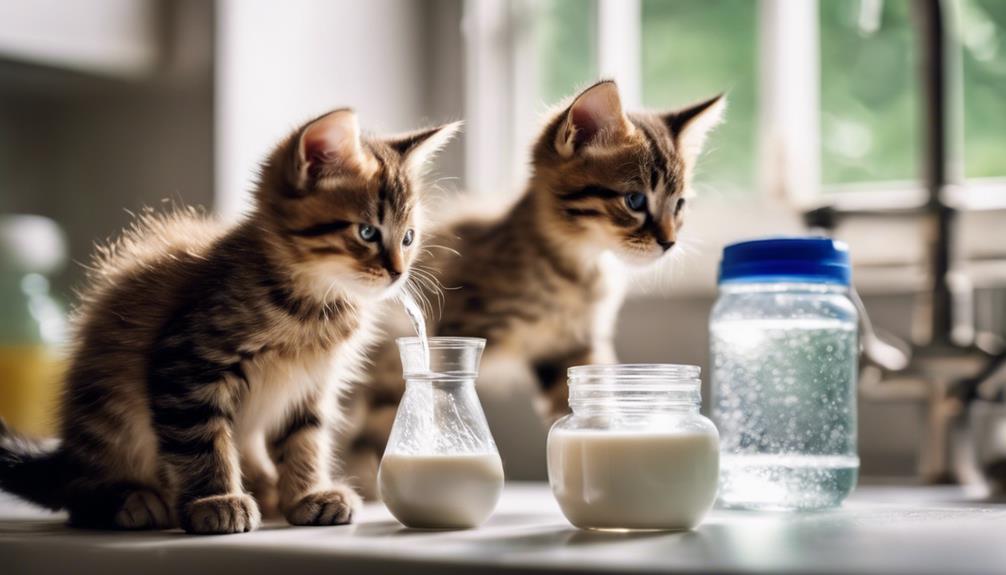
Proper preparation of kitten formula is crucial for ensuring the nutritional needs of newborn kittens are met effectively. When preparing formula for bottle-feeding, it is essential to follow the instructions on the packaging meticulously to provide the correct balance of nutrients. Here is a table summarizing key steps for proper formula preparation:
| Proper Formula Preparation | |
|---|---|
| 1. Follow instructions on packaging | |
| 2. Use sterilized bottles and nipples | |
| 3. Warm formula to body temperature | |
| 4. Shake well before feeding |
Feeding Schedule for Kittens
To ensure the proper growth and development of newborn kittens, establishing a consistent feeding schedule is essential. Newborn kittens should be fed small amounts of milk replacer every 2-3 hours. As they grow, you can gradually increase the time between feedings. Monitor their weight gain and adjust feeding amounts accordingly.
It's crucial to allow kittens to feed until they are full but avoid overfeeding to prevent digestive issues. Signs of a well-fed kitten include active and playful behavior, healthy weight gain, a shiny coat, bright eyes, regular bowel movements, and a strong bond with the caregiver.
Following a structured feeding schedule is crucial for the overall health and well-being of the kittens.
Techniques for Bottle Feeding
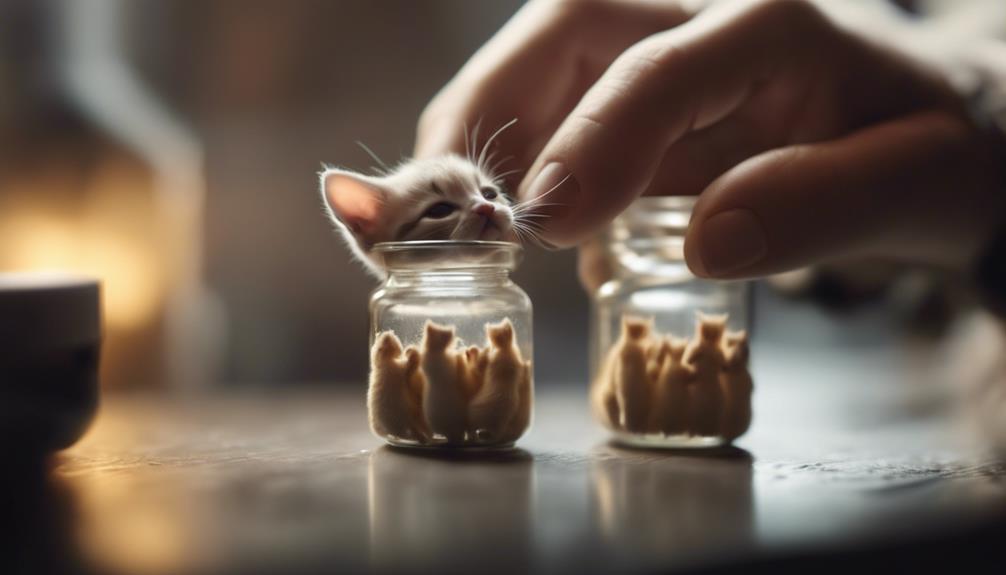
Utilizing the appropriate bottle feeding technique is essential for ensuring the proper nourishment and care of newborn kittens. Here are some key techniques to consider:
- Hold the kitten in a semi-upright position to prevent choking.
- Tilt the bottle to fill the nipple completely to avoid air intake.
- Encourage the kitten to suckle by gently pressing on the bottle.
- Allow the kitten to feed at its own pace, avoiding forceful feeding.
These techniques ensure a comfortable and effective feeding experience for the kittens, promoting their health and well-being.
Monitoring Kitten's Progress
In assessing the development of kittens, vigilance towards their growth milestones plays a crucial role in ensuring their overall health and well-being. Monitoring a kitten's progress involves tracking weight gain, which should be steady and consistent.
Additionally, observing the kitten's behavior and activity levels can provide insight into their overall health. A healthy kitten should display curiosity, playfulness, and a good appetite during feeding times.
Regular veterinary check-ups are essential to assess the kitten's development and address any concerns promptly. By closely monitoring these aspects, caregivers can ensure that kittens are thriving and developing as expected, setting them up for a healthy and happy life ahead.
Signs of a Healthy Kitten
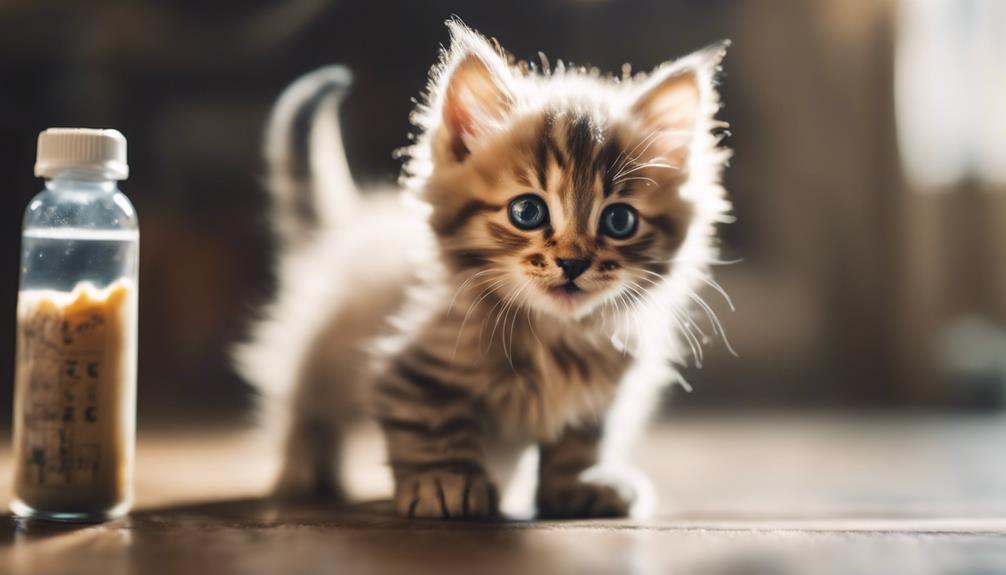
When monitoring a kitten's progress, it is essential to be able to recognize the signs of a healthy kitten as indicators of their overall well-being and development.
- Active and playful behavior
- Healthy weight gain and growth
- Shiny coat and bright eyes
- Regular bowel movements
These signs collectively demonstrate that a kitten is thriving and in good health.
Monitoring these aspects regularly can help caregivers ensure that the kitten is developing as expected and address any concerns promptly.
Common Mistakes to Avoid
To ensure successful bottle feeding of kittens with kitten formula, it is important to be aware of common mistakes that should be avoided for the well-being and health of the kittens. Here are some common mistakes to avoid:
| Common Mistakes to Avoid |
|---|
| Feeding cow's milk |
| Using human baby formula |
| Feeding too quickly |
| Not warming the formula |
| Overfeeding the kittens |
Alternative Feeding Options
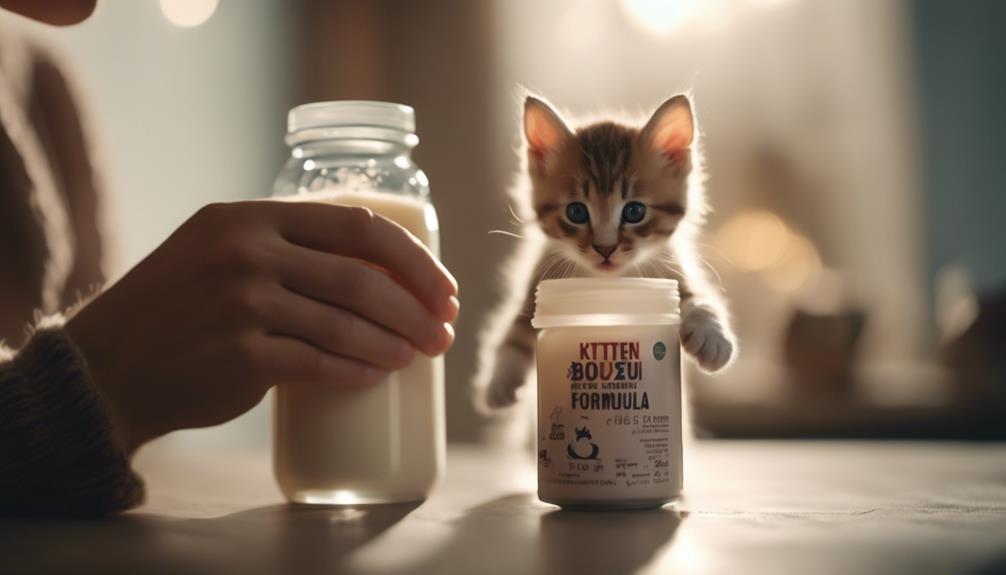
As an essential consideration in ensuring the health and well-being of kittens during bottle feeding, exploring alternative feeding options beyond traditional formulas can provide caregivers with additional resources for nourishing orphaned or sick kittens. When commercial kitten milk replacement is unavailable, caregivers can consider the following alternative options:
- Homemade kitten formula using karo syrup, goat's milk, egg yolks, and gelatin.
- Temporary use of goat's milk in emergencies.
- Consulting a veterinarian for guidance on alternative feeding options.
- Ensuring homemade formulas provide necessary nutrients for proper kitten growth and development.
Consulting a Veterinarian
Consult with a veterinarian to obtain expert guidance on alternative feeding options for kittens when commercial kitten milk replacement is unavailable. Veterinarians can provide valuable insights into suitable substitutes or homemade formulas that meet the nutritional needs of kittens. They can advise on the proper preparation, feeding schedule, and monitoring of the kitten's progress when commercial options are not accessible.
Additionally, veterinarians can assess the health status of the kittens and recommend specific formulas based on individual requirements. Seeking professional advice ensures that kittens receive adequate nourishment and care, promoting their growth and well-being. Veterinarians can offer tailored solutions to address the unique needs of each kitten, guiding caregivers in making informed decisions regarding their feeding regimen.
Special Considerations for Sick Kittens
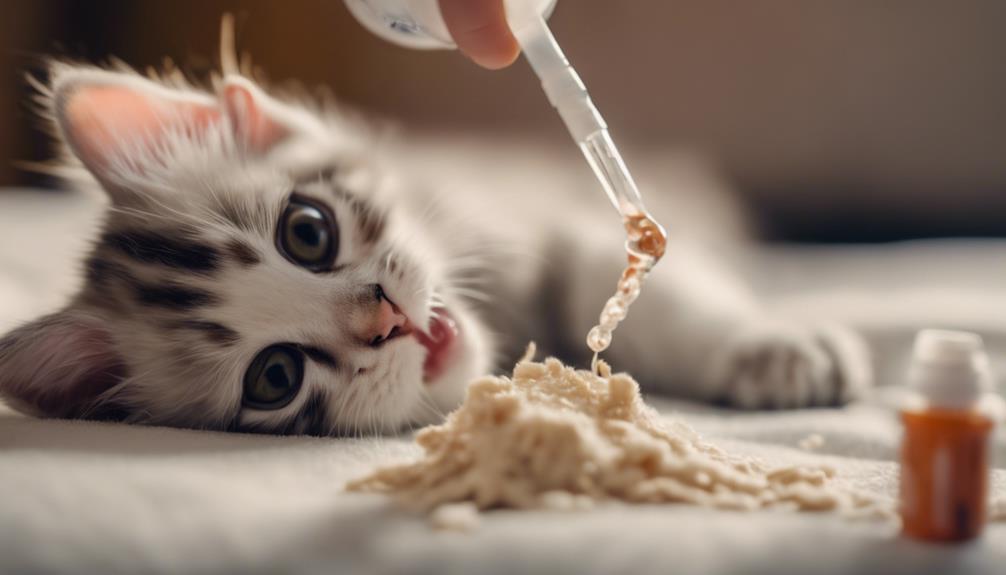
When caring for sick kittens, it is crucial to tailor their feeding regimen to accommodate their specific health needs. Sick kittens may have trouble feeding or require specialized care to ensure they receive the necessary nutrients to aid in their recovery.
Here are some special considerations for feeding sick kittens:
- Consult a veterinarian for guidance on the appropriate formula and feeding schedule.
- Monitor the sick kitten's weight and overall condition regularly.
- Consider using a syringe or feeding tube if the kitten is too weak to suckle from a bottle.
- Adjust the feeding amounts and frequency based on the kitten's health requirements.
Weaning Off Kitten Formula
Tailoring the feeding regimen for sick kittens is crucial to ensure they receive the necessary nutrients for recovery, and as kittens start to show signs of improvement, the process of weaning off kitten formula becomes an important transition in their development. To effectively wean kittens off formula, gradual introduction of solid food is essential. Here is a suggested weaning schedule:
| Week | Formula Feeding Frequency | Solid Food Introduction |
|---|---|---|
| 4 | 4 times a day | Start introducing wet kitten food in small amounts. |
| 5 | 3 times a day | Increase wet food portions and introduce dry kitten food. |
| 6 | 2 times a day | Offer a mix of wet and dry food to encourage transition. |
| 7 | 1-2 times a day | Gradually reduce formula and monitor kitten's acceptance of solid food. |
Transitioning to Solid Food
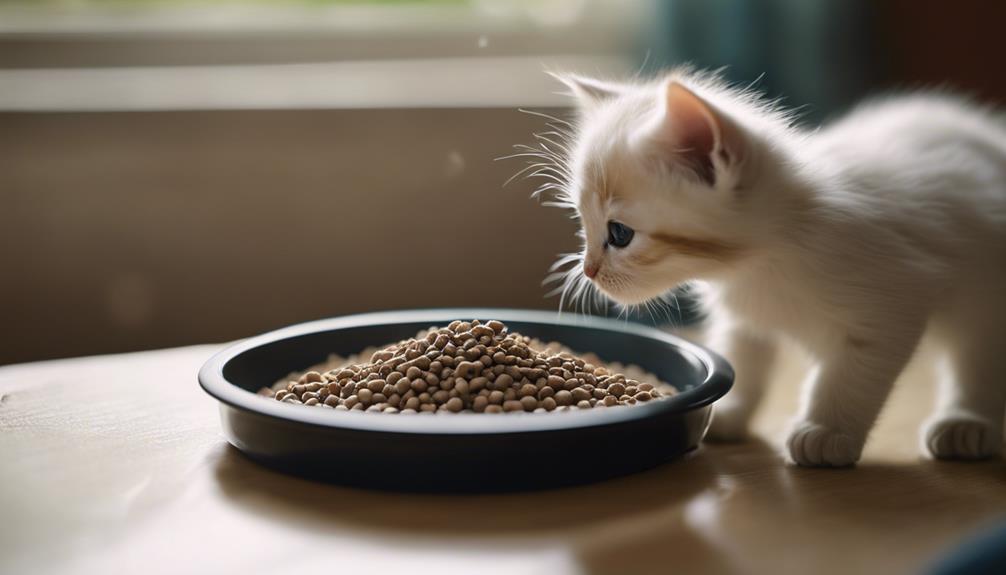
Transitioning a kitten from formula to solid food is a significant milestone in their development and nutritional journey. It's essential to introduce solid foods gradually to ensure a smooth transition.
Here are some tips to help you successfully transition your kitten to solid food:
- Start by mixing a small amount of wet kitten food with formula to create a soupy mixture.
- Offer this mixture to the kitten in a shallow dish to encourage exploration.
- Gradually decrease the amount of formula in the mixture as the kitten becomes more accustomed to the texture and taste of solid food.
- Monitor your kitten's response and adjust the transition pace based on their comfort and eating habits.
Tips for Successful Bottle Feeding
To ensure successful bottle feeding of kittens, maintaining a consistent feeding schedule and using proper technique is crucial for their growth and development. When bottle feeding kittens, it's essential to follow these tips:
| Tips for Successful Bottle Feeding |
|---|
| Feed kittens every 2-3 hours |
| Warm the formula to body temperature |
| Use a specialized kitten bottle |
| Feed gently and ensure proper positioning |
| Clean the kitten's face after feeding |
Frequently Asked Questions
Can Kitten Formula Be Used for Adult Cats as Well?
Kitten formula is specifically formulated to meet the nutritional needs of young kittens. While it can be used in emergencies for adult cats, it lacks certain nutrients essential for adult feline health. Consult a veterinarian for appropriate feeding recommendations.
Are There Any Specific Guidelines for Feeding Kittens With Special Dietary Needs?
When addressing kittens with special dietary needs, consult a veterinarian for tailored advice. Factors such as allergies, sensitivities, or health conditions require individualized feeding plans. Ensure specialized formulas cater to specific requirements, promoting optimal health and development.
How Long Can Prepared Kitten Formula Be Stored Before It Needs to Be Discarded?
Prepared kitten formula should be stored according to the manufacturer's guidelines to maintain freshness and prevent spoilage. Proper storage is crucial for the health of the kittens, ensuring they receive safe and nutritious feedings.
Are There Any Differences in the Nutritional Content of Dry Versus Canned Kitten Formulas?
Dry and canned kitten formulas may differ slightly in moisture content and texture, but both provide essential nutrients for growth and development. Understanding these variances can help in selecting the most suitable option for a kitten's nutritional needs.
Is It Safe to Mix Kitten Formula With Water for Dilution Purposes?
While it may seem beneficial to dilute kitten formula with water for various reasons, it is essential to follow the manufacturer's instructions precisely. Dilution can alter the nutrient balance, potentially affecting the kitten's growth and health.
How Does Kitten Formula Bottle Feeding Fit into a Kitten’s Nutritional Needs?
When it comes to top kitten nutrition tips, bottle feeding with kitten formula is essential for meeting a kitten’s nutritional needs. This method ensures that newborn kittens receive the proper balance of nutrients to support their growth and development. Bottle feeding allows for controlled portion sizes and helps monitor the kitten’s intake.
Conclusion
In conclusion, proper utilization of kitten formula is essential for the growth and development of newborn felines.
By selecting the right formula, preparing it correctly, following feeding schedules, and monitoring health indicators, caregivers can ensure the well-being of orphaned or hand-reared kittens.
Through a balanced approach to feeding practices and seeking veterinary guidance when necessary, caregivers play a crucial role in fostering healthy, thriving kittens in their care.




